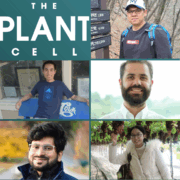Zombie Donkeys and the Modern Science Ph.D. Degree
By Andrew Hanson
 In George Orwell’s masterpiece ‘Animal Farm’ Benjamin the donkey tells the other animals “Donkeys live a long time. None of you has ever seen a dead donkey”. The point: history had hit him hard and often, so he could foresee outcomes.
In George Orwell’s masterpiece ‘Animal Farm’ Benjamin the donkey tells the other animals “Donkeys live a long time. None of you has ever seen a dead donkey”. The point: history had hit him hard and often, so he could foresee outcomes.
As a non-dead (zombie) academic donkey with 30+ years in the business I’ll follow in my colleague Benjamin’s hoof prints and reflect on PhD career outcomes.
When I started in science we wrote by hand with fountain pens, calculated with slide rules, and handled almost everything without fume hoods, eye protection, or gloves. Graphics specialists and expert typists helped us prepare manuscripts. Computers with the power of an electronic greeting card occupied half a room and spoke arcane languages. Outside the lab, abortion and homosexuality were illegal, teachers beating children was best-practice in schools, and boys joined the military at 14 or 15 – check out hero Jack Cornwell V.C. https://www.google.com/amp/s/www.bbc.com/news/amp/uk-england-36386665. Quite a difference to today.
Memories.
More to the point, only around 10% of people had any kind of degree, and science PhDs were far rarer – and in some ways more prized – than MDs. Career certainty abounded; a BS degree in science meant a secure middle class job with a real pension at around 60 and a science PhD promised something at least as good as that in academia, government, or industry. It was a safe world for zombie academic donkeys.
That world is no more. Like the famous Monty Python parrot, it has bought the farm, kicked the bucket and is floating on clouds playing a harp. It is an ex-world. It is not resting. It is well and truly dead.
But today’s science PhD/postdoc mill churns on almost regardless, overproducing bright, hopeful minds for the dead world we just fleetingly revisited. There is already not much professional middle class job certainty left. There may soon be none, and maybe no professional middle class either, at least as we now know it. Computers smaller than a greeting card will be smarter than people, PhDs included. Tenured academic jobs – already quite rare – will dwindle and morph into a gig economy as universities strive to slash costs and online teaching technology evolves.
You can run from this self-propelled academic train wreck but you can’t hide. No, wait – you can’t even run. There’s nowhere left to run to, except maybe Asian countries that are still expanding university education and raising quality at breakneck speed. But even there the hiring boom will soon be over.
Hope.
Enough apocalypse, already. Now for some hope. Nothing can better prepare you for the radical uncertainties of the next decades than a PhD, if done right. Science PhD training should take you to the edge of the unknown and have you stare down into the abyss and realize that nobody knows the answer to the question you’ve taken on except potentially you. If in your 3, 4, or 5 years of PhD training (it should not be more) you come anywhere near answering your question, or even just formulate it better, then your mind is rewired and your worldview is reset – forever. You are vastly better equipped to define problems, and to solve them by working intelligently, diligently and as autonomously as needed for as long as it takes. And to communicate all this to different clienteles using different media. This gives you a priceless edge over the competition, who are relying on someone else to analyze the evidence, to tell them what to do as a consequence, to motivate them to do it, and to tell them and everyone else what’s going on.
Your Edge.
This edge is called broad employability and leadership ability. PhD training should give you these things. Too often it sort-of does, but this is under-appreciated or unrecognized by the PhDs themselves – and so isn’t leveraged to the max.
You may have noticed that I’ve used the word ‘should’ several times. Very intentionally, because PhD and postdoctoral training can fall short of the mark. This is not just down to the advisor. You as a PhD/postdoctoral trainee have agency. If you know what a PhD/postdoc should achieve (and now you do!) you are equipped to negotiate a good outcome. And BTW negotiating skills are part of what PhD training should impart, too.
To wrap this up: While the times have changed the value of deep scientific training has not gone down but up. The complexities of today’s and tomorrow’s best job opportunities require skilled thinkers, but skilled thinkers who think opportunity instead of security, change instead of stasis, and the wide world instead of the narrow cloister. A PhD can and should turn you into that kind of thinker. Not into a zombie academic donkey. Why would anyone want to be that nowadays?
 Author: Andrew Hanson, Sr. Eminent Scholar, University of Florida https://hos.ifas.ufl.edu/people/on-campus-faculty/andrew-d-hanson/
Author: Andrew Hanson, Sr. Eminent Scholar, University of Florida https://hos.ifas.ufl.edu/people/on-campus-faculty/andrew-d-hanson/










Leave a Reply
Want to join the discussion?Feel free to contribute!